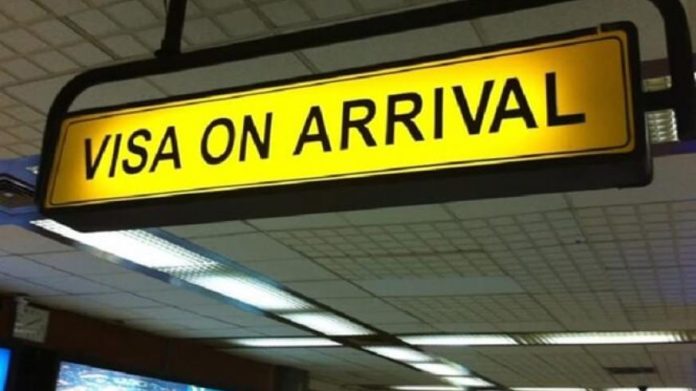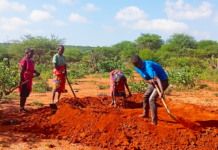By Winnie Kamau
The Africa Visa Openness Index 2018 Report
It aims to show at a glance which countries are facilitating travel for citizens of other countries and how, whether they allow people to travel to their country without a visa, or if travelers can get a visa on arrival in the country, or if visitors need to get a visa before travel.
Data on visa openness was collected in June and July 2018. The primary source of information was the International Air Transport Association (IATA).
The Africa Visa Openness Index is a joint work of the African Development Bank (AfDB), the African Union Commission (AUC) and the World Economic Forum Global Agenda Council on Africa. Tracking changes in country scores over time to show which countries are making improvements that support a freer movement of people across Africa.
In 2018, the African Continental Free Trade Area (AfCFTA) and Single African Air Transport Market were launched, and progress was made on the Free Movement of Persons Protocol.
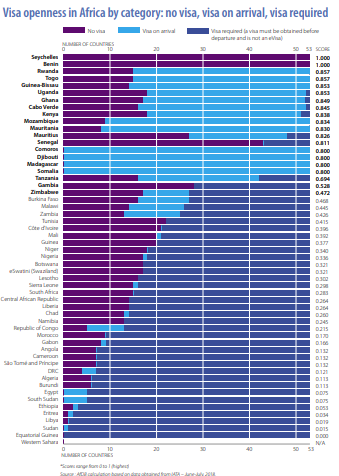
The AfCFTA was signed by close to 50 countries at the AU Summit in March 2018, alongside the Kigali Declaration and the Free Movement Protocol.11 Te AfCFTA creates one African market of 1.2 billion people, with a GDP of US$2.5 trillion, that has the potential to boost intra-African trade by 52% by 2020,12 benefitting African producers, consumers, and traders.
Visa Openness findings show that African countries on average are becoming more open to each other, with indications that travel within the continent is getting easier. Compared to 2017 and 2016, progress has been made in 2018 against visa openness indicators.
Africans currently do not need a visa to travel to more countries than in previous years, and they need visas to travel to fewer countries. However, the fact that Africans still require visas to travel to just over half of other African countries shows more progress is needed to realise free movement of people continent-wide.
“Regional integration and trade based upon the free movement of persons, goods, services,
Benin was the highest performing country since the last edition of the Africa Visa Openness Index. The country increased its score by 200%, moving from 27th place in 2017 to join Seychelles at the top in 2018. Benin is only the second country on the continent to offer visa-free access to all African countries and the first Francophone country to do so.
“Inspired by Rwanda’s experience, I have come to the decision that Benin will no longer demand visas for Africans. This South-South cooperation can become a reality.” Patrice Talon President of Benin.
President Talon’s landmark decision to open Benin’s borders for African visitors from January 2017 has been heralded by ECOWAS as promoting a people-centered approach to integration in the region. Benin’s open visa policy made headlines in African and global news.
“It’s a decision that gives weight to the objective of going from an ECOWAS of States to an ECOWAS of the people by 2020.” Moustapha Cisse Lo ECOWAS Parliament President
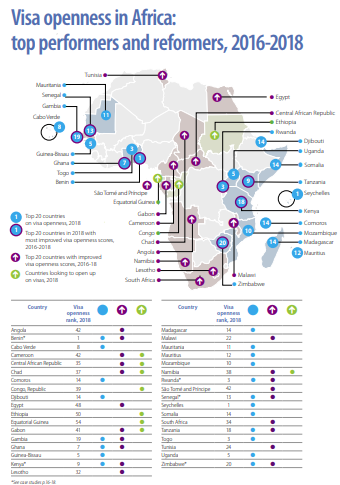
Kenya moved up six places into the top 10 countries in the Africa Visa Openness Index in 2018. The country’s improved score follows its new visa-on-arrival policy for all Africans, which was highlighted in President Kenyatta’s inauguration speech in November 2017.
“For my fellow Africans, the free movement of people on our continent has always been a cornerstone of Pan-African brotherhood and fraternity. Today, I am directing that any African wishing to visit Kenya will be eligible to receive a visa at the port of entry. To underscore Kenya’s commitment, this shall not be done on the basis of reciprocity. The freer we are to travel and live with one another, the more integrated and appreciative of our diversity, we will become.” said Uhuru Kenyatta President of Kenya
Rwanda continues to move up the Africa Visa Openness Index and ranks in the third position in 2018, having improved access for nine countries on the continent. Africans enjoy liberal access to Rwanda, with no visa required for 15 countries and visa on arrival for 38 countries.
“Citizens of all countries will get a visa upon arrival without prior application, starting January 1, 2018.” Yves Butera Spokesperson, Directorate-General of Immigration and Emigration, Rwanda
Senegal rose steadily upwards in the top 20 countries in the Africa Visa Openness Index in 2018. Te country built on progress made since 2016, with improved visa-free access for more countries. It is one of few countries in the top 20 that does not
Zimbabwe continued to move up the Africa Visa Openness Index and entered the top 20 countries in 2018. Zimbabwe has made steady progress since 2016, improving its liberal access. The government is introducing a visa-on-arrival policy for 28 countries worldwide, as well as for SADC members, to build the tourism sector and promote greater investment. Total travel and tourism contributed 7.1% to Zimbabwe’s GDP in 2017 and is forecast to rise by 2.1% in 2018, according to the World Travel & Tourism Council Economic Impact 2018 report.
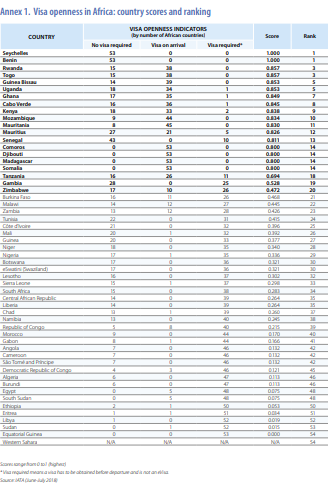
From the
Ethiopia automated its visa application system and announced a decision to liberalize visas for African travelers. Te announcement was made by Ethiopian Prime Minister Abiy Ahmed in May 2018 and has been widely welcomed in African policy and media circles.
“A relaxed visa regime will enhance both Ethiopia’s openness and will allow the country to harness the significant stopover transit traffic of Ethiopia,” said Fitsum Arega Chief of Staf to the Prime Minister, Ethiopia.
Namibia moved ahead to liberalize its visa policy framework in October 2017, with a decision for all Africans to be issued visas on arrival, as part of a wider goal to remove visa requirements altogether.
This follows earlier plans to allow SADC citizens to access the country visa-free. Since 2016, African diplomat and official passport holders can enter the country without a visa, following President Hage Geingob’s announcement citing the value of African unity.
The Central African Economic and Monetary Union (CEMAC) has ratified free movement of people as of October 2017, allowing citizens from the six member states – Cameroon, Central African Republic, Chad, Equatorial Guinea, Gabon and the Republic of Congo – to travel visa-free.
Globally, people are increasingly on the move for travel and tourism as consumer spending rises. The sector, which supports one in ten jobs worldwide, saw growth of 4.6% in 2017.
Against this backdrop, in June 2018 African countries voiced the need to drive sustainable tourism development, measuring impact with data. Innovation, entrepreneurship, and technology are helping to build a sustainable, resilient tourism industry across Africa – elements, which are supported by promoting more liberal visa regimes on the continent.

